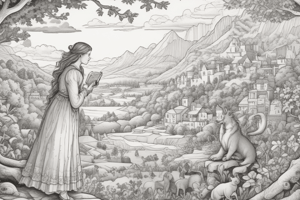Podcast
Questions and Answers
Literary devices are techniques used by authors to convey ______, create tone, and evoke emotions in their writing.
Literary devices are techniques used by authors to convey ______, create tone, and evoke emotions in their writing.
meaning
A comparison between two unlike things using 'like' or 'as' is called a ______.
A comparison between two unlike things using 'like' or 'as' is called a ______.
simile
The repetition of initial consonant sounds in words that are close together is called ______.
The repetition of initial consonant sounds in words that are close together is called ______.
alliteration
Words that imitate the sounds they describe are called ______.
Words that imitate the sounds they describe are called ______.
A reference to a person, place, event, or work of art outside the text itself is called an ______.
A reference to a person, place, event, or work of art outside the text itself is called an ______.
Hints or clues that suggest events that will occur later in the text are called ______.
Hints or clues that suggest events that will occur later in the text are called ______.
Flashcards are hidden until you start studying
Study Notes
Literary Devices
Literary devices are techniques used by authors to convey meaning, create tone, and evoke emotions in their writing. Here are some common literary devices:
Figurative Language
- Metaphor: A comparison between two unlike things without "like" or "as."
- Simile: A comparison between two unlike things using "like" or "as."
- Personification: Attributing human-like qualities to non-human entities, such as objects or animals.
- Hyperbole: An exaggeration used for emphasis or effect.
- Alliteration: The repetition of initial consonant sounds in words that are close together.
Sound Devices
- Onomatopoeia: Words that imitate the sounds they describe.
- Assonance: The repetition of vowel sounds in words that are close together.
- Consonance: The repetition of consonant sounds in words that are close together.
Rhetorical Devices
- Allusion: A reference to a person, place, event, or work of art outside the text itself.
- Irony: A contrast between what is expected and what actually occurs.
- Symbolism: Using an object, color, or other element to represent an abstract idea or concept.
Structural Devices
- Foreshadowing: Hints or clues that suggest events that will occur later in the text.
- Flashback: A scene or episode from the past inserted into the present narrative.
- Stream of consciousness: A writing style that mimics the natural flow of thoughts, feelings, and observations.
Other Devices
- Imagery: Language that appeals to the senses, creating vivid mental images.
- Tone: The author's attitude or feeling conveyed through the writing.
- Motif: A recurring theme, idea, or symbol throughout a text.
These literary devices help authors create rich, engaging, and meaningful texts that resonate with readers.
Studying That Suits You
Use AI to generate personalized quizzes and flashcards to suit your learning preferences.




